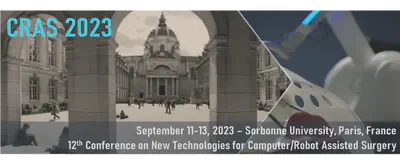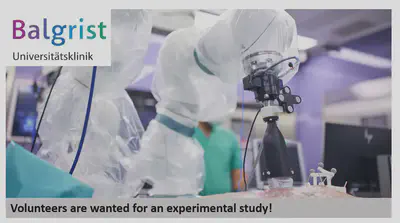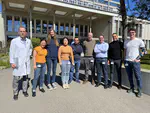Posts
Post overview:
- Focus: Design principled approaches for trustworthy AI-enabled surgical assistance with a focus on real-time imaging data
- Line manager: Tom Vercauteren
- Institution: King’s College London
- Salary: Grade 6 £41,386-£48,414 or Grade 7 £49,737-£55,306 per annum, including London Weighting Allowance
).](/post/2023-05-19-twairobjob/featured_hu4954067132841876274.webp)
Job description
We are seeking a Post-doctoral Research Associate to develop novel trustworthy artificial intelligence (AI) algorithms able to extract actionable information from surgical imaging data.
- Submission website here
- Deadline for manuscript submissions: 31 January 2024

Description
Computer vision and Artificial Intelligence (AI) are emerging as key technologies in computer-assisted orthopedic surgery and have recently led to breakthroughs in performance and autonomy. In the years ahead, these technologies will emerge as the most important lever to aim to improve quality, efficiency, and outcomes of surgical care. However, there are significant scientific and technical challenges that we need to overcome. In this Special Issue we call for original articles, review articles, concept papers, as well as preclinical and clinical studies that demonstrate the benefits and challenges of computer vision and AI in orthopedic surgery.
Call for Extended Abstracts - 12th joint Conference on New Technologies for Computer/Robot Assisted Surgery – 11-13 September 2023, Sorbonne University, Paris, France
- conference site: https://cras-eu.org/cras-2023/
- submission site: https://easychair.org/conferences/?conf=cras2023
- deadlines : Extended Abstracts due May 15, 2023
- deadlines : Call for demonstrations until July 31, 2023

Surgical robotics aims at improving surgical practice and its outcome, by providing the surgical team with new tools for improved safety, reproducibility, gestural performance and ergonomics. Millions of patients have benefitted from robotically assisted surgical procedures during the past two decades, with a recent explosion of market cleared systems for a wide variety of procedures, after years of a quasi-monopolistic situation dedicated to a very limited set of indications. Still a lot is to be done in terms of research, with three concurrent aims:
This video presents work lead by Christopher E. Mower. OpTaS is an OPtimization-based TAsk Specification Python library for trajectory optimization and model predictive control. The code can be found at https://github.com/cmower/optas. This work will be presented at the 2023 IEEE International Conference on Robotics and Automation (ICRA).


![[Job] Research Associate / Research Fellow in "Trustworthy Artificial Intelligence for Surgical Imaging and Robotics"](/post/2023-05-19-twairobjob/featured_hu4944105134717276193.webp)




